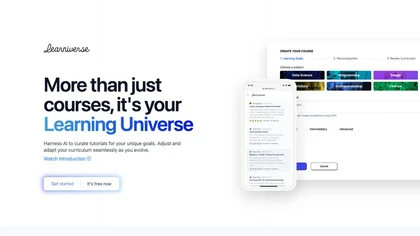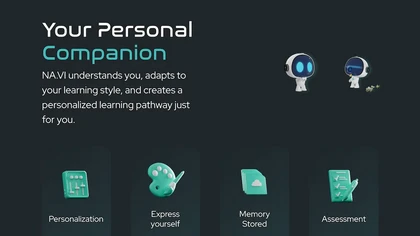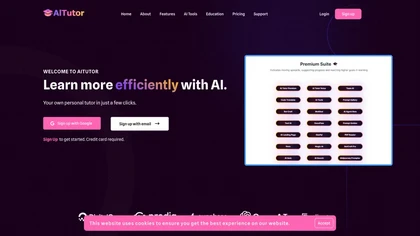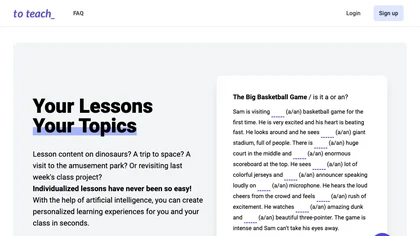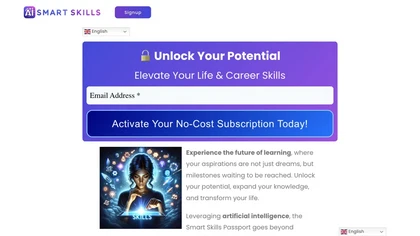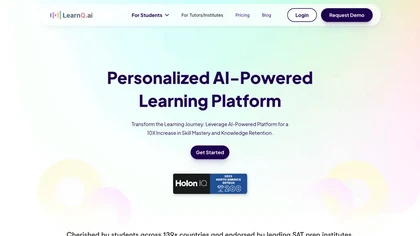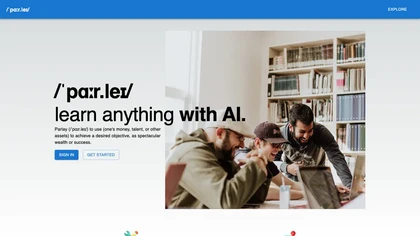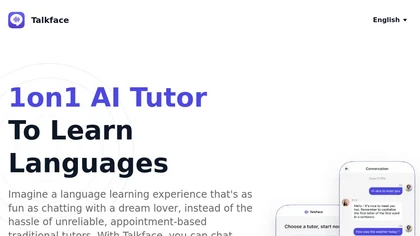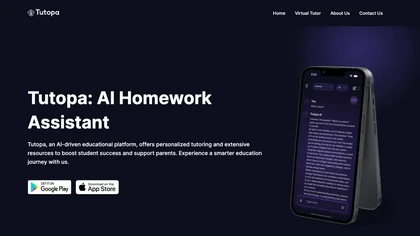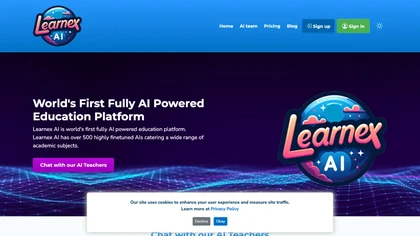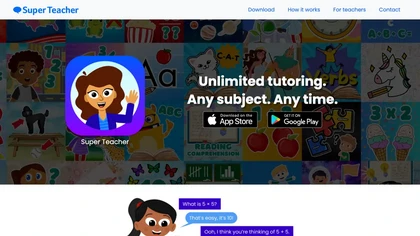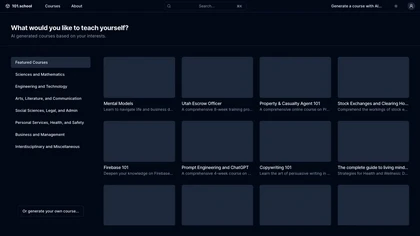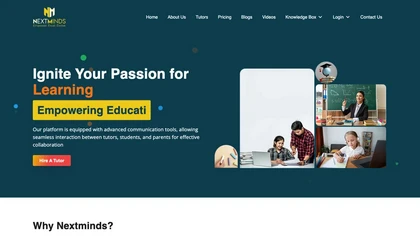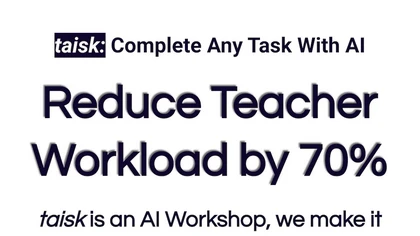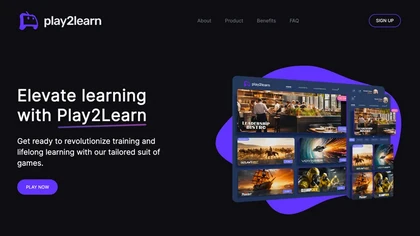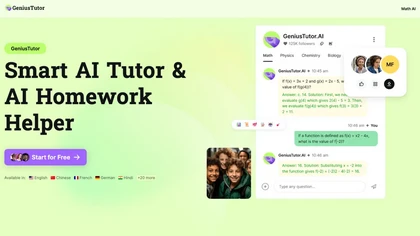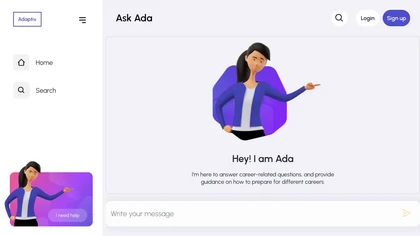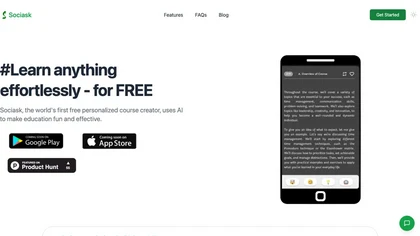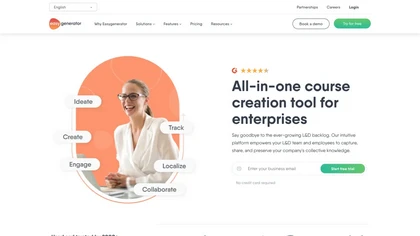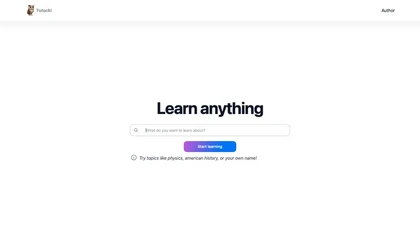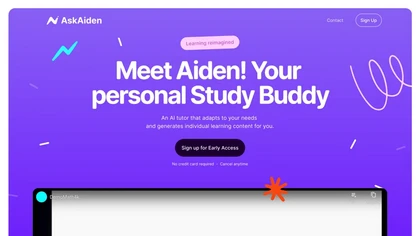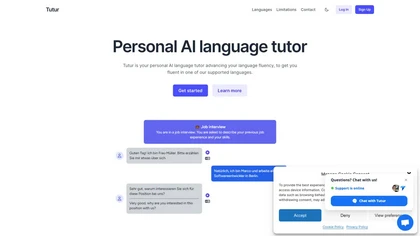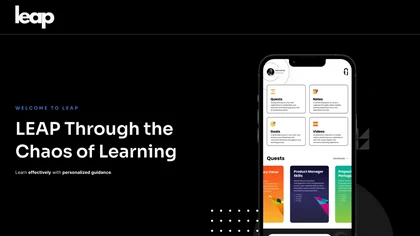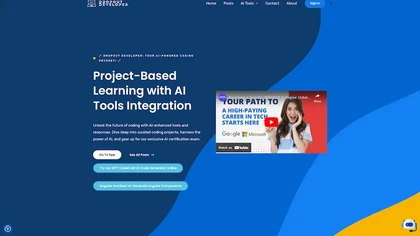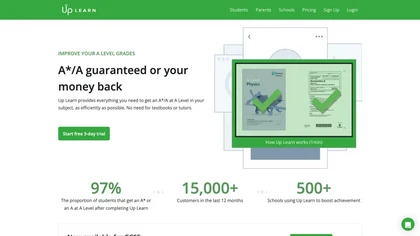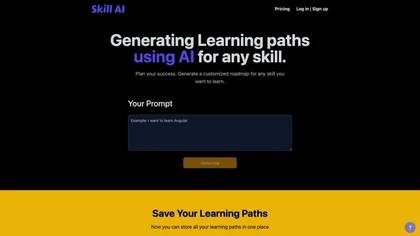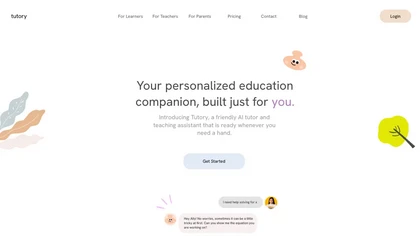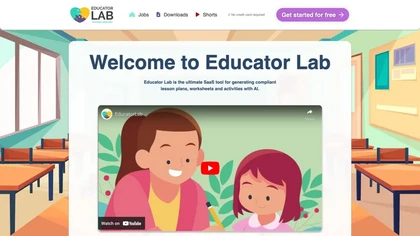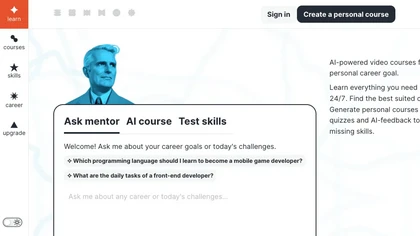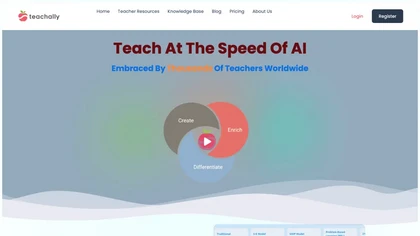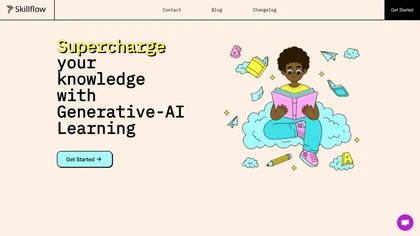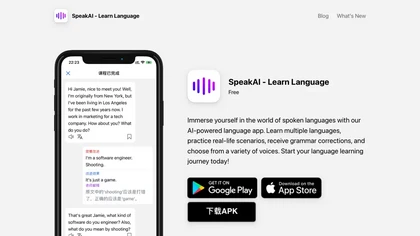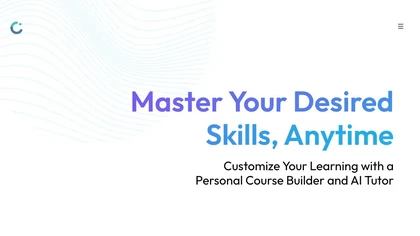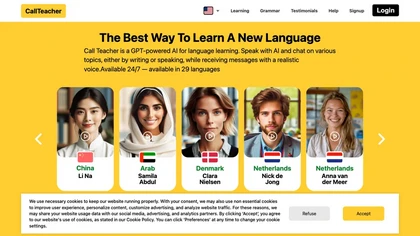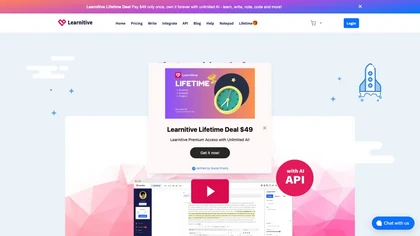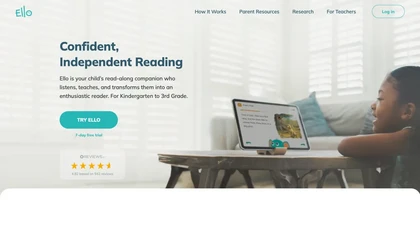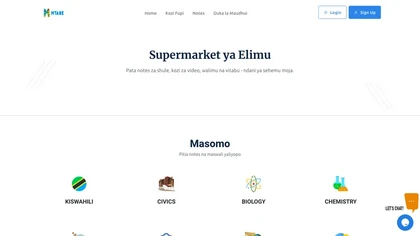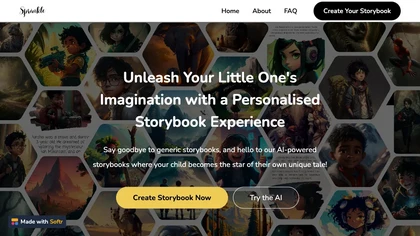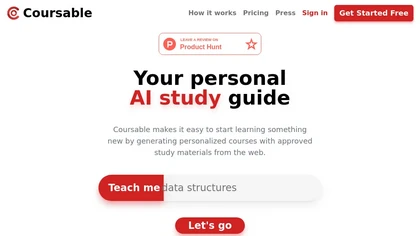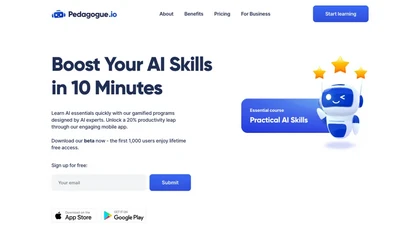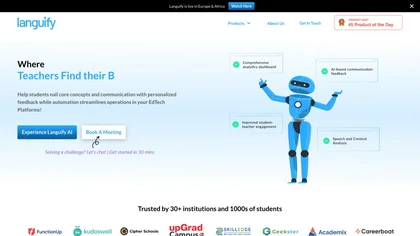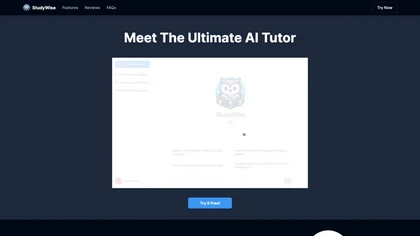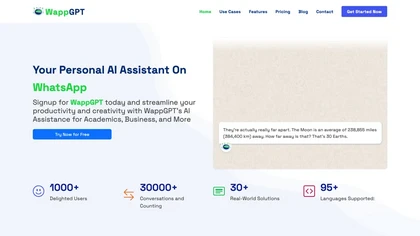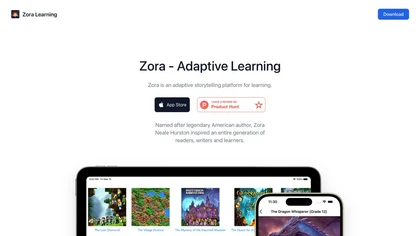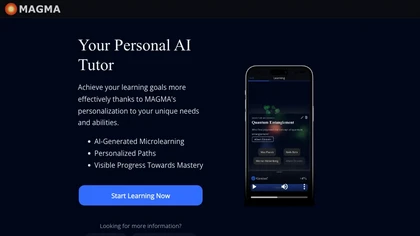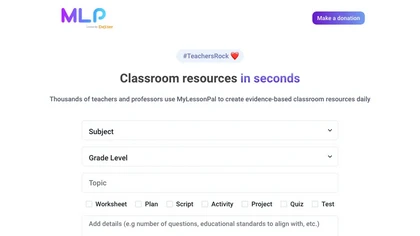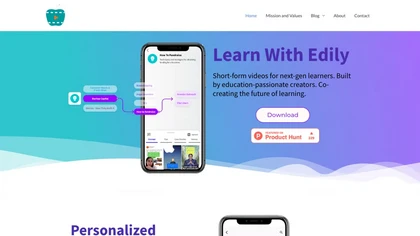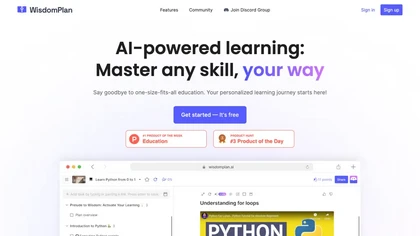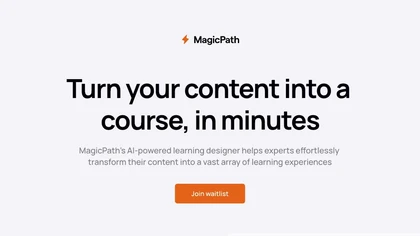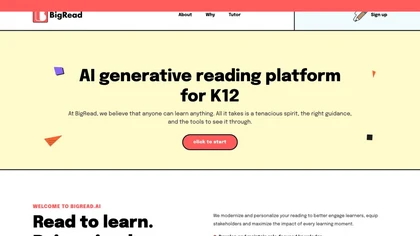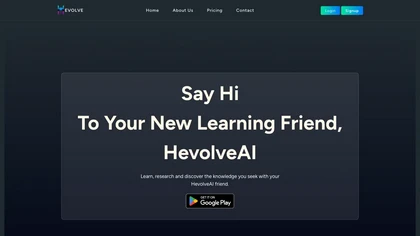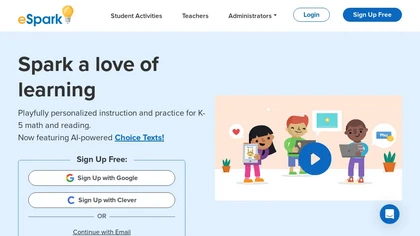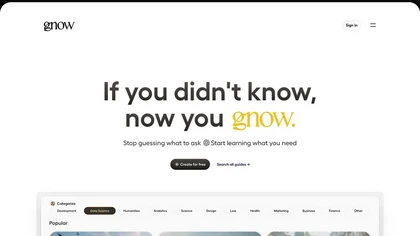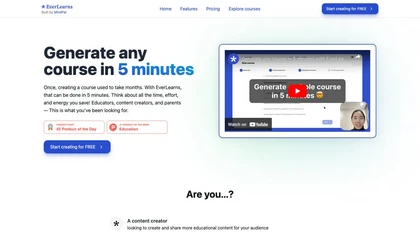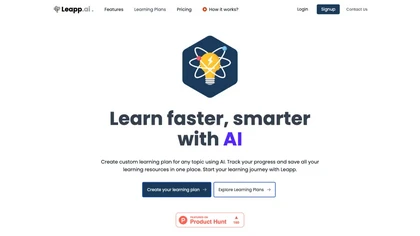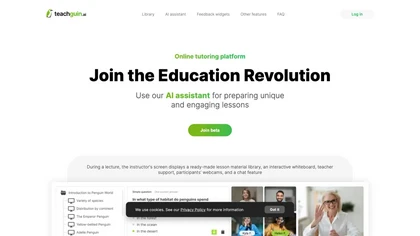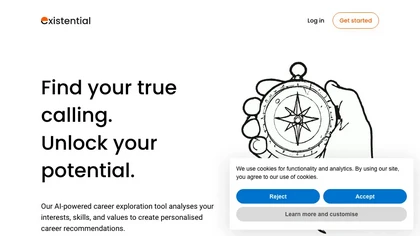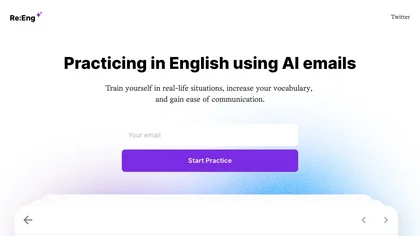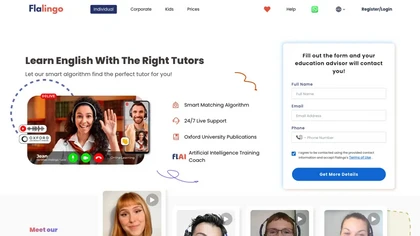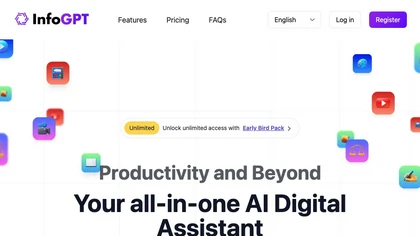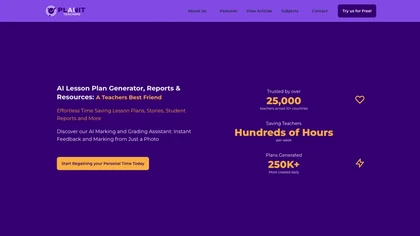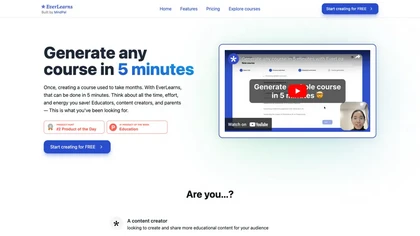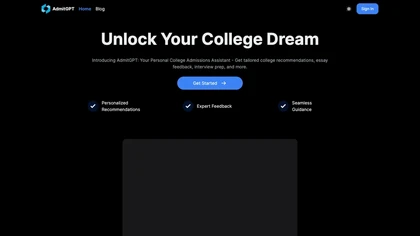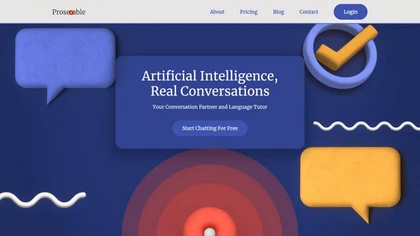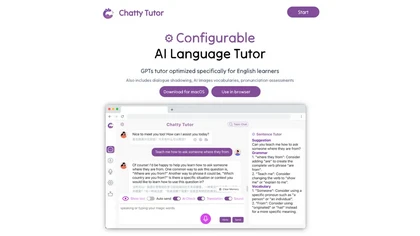AI use cases for Continuous education
Generative AI can be applied in various applications for continuous education. Here are some examples to explore below for inspiration with AI tools to get you started with using AI in continuous education.
🛠️ 70 AI tools for Continuous education
Explore a dynamic list of some of the most popular tools to get you started with various AI use cases and applications for Continuous education to streamline your workflows and productivity today.
Learniverse features
- Curates tutorials based on unique learning goals
- Seamlessly adjusts and adapts curriculum as user progresses
- Mobile-friendly UI
- Personalized pathways tailored to ambitions
- Provides trustworthy collection of educational resources
NA.VI features
- Personalized learning pathways
- Adaptive to unique learning styles
- Interactive features
- Assessment tools exploration
- Data privacy prioritization
AI Tutor features
- Personalized education
- AI models for teaching
- Assistance with assignments
- Support for multiple languages
- Voice-activated features
To Teach features
- Create personalized exercises
- Create lesson plans
- Tailor teaching materials to students' interests
- Offer free and paid plans
- Work alongside human teachers
SmartLifeSkills
4.8SmartLifeSkills features
- Interactive platform with AI chatbots
- Multilingual lessons with authentic accents
- Adjustable playback speed
- Advanced text-to-speech technology
- Custom quiz generator
LearnQ.ai features
- Personalized AI-powered learning platform
- Real-time insights and data-driven guidance
- AI-powered assessments for addressing learning gaps
- AI-powered student analytics for tracking progress
- AI tutor (Mia) for personalized guidance
Parlay features
- Customized learning paths creation
- Progress tracking features
- Limitless customization options for learning styles
- Learning convenience with anytime, anywhere access
- Free access option
🔥
Create your account, save tools & get personal recommendations
Receive a weekly digest of our handpicked top tools.
Unsubscribe anytime
Talkface features
- 1-on-1 tutoring
- Personalized curriculum
- Language learning
- Fun and engaging
- Affordable solutions
- Eliminates need for unreliable tutors
- Available on android and ios devices
Tutopa features
- Personalized tutoring
- Extensive educational resources
- Instant feedback feature
- Coverage of all grades
- User-friendly app interface
Learnex AI features
- AI-powered education platform
- 500 highly fine-tuned AI teachers
- Chat support for various academic subjects
- Assistance in subjects like mathematics, history, sociology
- Diverse range of topics covered
Language Atlas features
- adaptive lessons
- flashcard usage
- speaking practice
- audio and video examples
- global community
Super Teacher features
- Unlimited tutoring for $10/month
- Connect with experienced teachers
- Conversational and interactive format
- Personalized learning experience
- Variety of subjects available
101.school features
- Course recommendation generation
- Innovative course search feature
- AI technology utilization
- Wide range of course topics
- Diverse subject coverage
Nextminds features
- online tutoring platform
- connects students with expert tutors
- offers private one-on-one sessions and group classes
- user-friendly platform for easy scheduling
- promotes effective collaboration between tutors, students, and parents
Interactive Tutor features
- AI bot creation and customization
- Integration with popular platforms (Wonde, Teams, Google)
- Access to GPT-3.5, GPT-4.5 Turbo, Dall-E, and AI Bot Library
Play2Learn features
- Transforms training and lifelong learning through gamification
- Provides dynamic and immersive scenarios for users
- Offers interactive learning experience tailored to individual goals
- Utilizes AI tools for customization of scenarios and tests
- Allows tracking of progress, identifying knowledge gaps, and enjoying diverse gaming scenarios
GeniusTutor ai features
- Comprehensive academic support
- Powered by cutting-edge GPT language models
- Tailored solutions across STEM and humanities fields
- Contextual analysis capabilities
- Personalized learning assistance for students
Adaptiv Academy features
- Personalized online courses
- Adaptive learning
- Searchable courses
- Progress tracking
- Referral programs
Sociask features
- Personalized course creation
- Tailored learning experiences
- Adaptive learning approach
- Use of intuitive examples and analogies
- Utilization of AI for enhanced comprehension
EasyAI features
- Consent management
- Cookie utilization
- Auto-translation into 75 languages
- Text-to-speech capabilities
- Importing PowerPoint presentations
TutorAI features
- Learning
- Customization
- Tracking
- Interactive
- Quizzes
Ask Aiden AI features
- Adapts to student's needs
- Generates custom learning content
- Provides personalized lessons and quizzes
- Offers real-time insights and analysis
- Includes tools like quizzes, notes functions, and simulations
Tutur features
- Detailed insight into fluency progress
- Multiple practice scenarios
- User-friendly interface
- Speech analysis
- Progress tracking
Leap Learning features
- Personalized guidance
- Comprehensive collection of video-based text-based formats
- Flexible content types for different learning preferences
- Subscription service with beta testing phase
- Focus on utility in various subjects like business strategy, management, finance, data science
Dropout Developer features
- Project-based learning
- Personalized education paths
- Free resources
- Expert guidance
- Supportive community
Up Learn features
- AI-powered educational tool
- World-class learning content
- Interactive videos
- Detailed progress tracking
- AI-powered diagnostic algorithm
SkillAI features
- Personalized learning path generation
- Skill-based roadmap creation
- Progress tracking
- Subscription for early feature access
- Ease in planning learning path
Tutory features
- Personalized education companion
- Adaptive memory system
- Tailored learning experience
- Teaching assistant functionalities
- Support for educators, parents, and learners
EducatorLab features
- Generate compliant lesson plans
- Create PDF and DOC files
- Tailored to specific grades, academic subjects, and levels
- Access a vast library of educational resources
- Automate the assessment process
Unschooler features
- Career guidance
- Personalized courses
- Video courses
- Quizzes
- Ai feedback
Teachally features
- Personalized lesson plan creation
- Alignment with over 400,000 educational standards
- Enrichments tailored to each student's needs
- Instant translations in over 100 languages
- Dynamic assignment assessment and customization
Skillflow features
- Single prompt input
- Course content generation
- Game-based learning experience
- Progress tracking
- Caters to learners of all levels
SpeakAI.cc features
- AI-powered language learning app
- Personalized learning paths and interactive exercises
- Support for a wide range of languages
- Real-time feedback and personalized grammar suggestions
- Real-time dialogue feature for practicing with virtual partners and native speakers
Chat2course features
- Customizable learning
- Personal course builder
- Ai tutor
- Ai-curated course selections
- Human collaboration features
Callteacher features
- Real-time interaction for practicing speaking, listening, reading, and writing skills
- Personalized courses tailored to individual progress and interests
- Engage in one-on-one conversations with AI teachers
- Multilingual support for 29 languages
- 24/7 service availability and progress tracking
lingoXpress features
- Comprehensive language learning tool
- Accessible on Kindle and smartphones
- Wide array of resources including books, audio content, daily word features
- AI tutor for personalized learning
- Support for over 65 languages, including constructed languages like Klingon and Dothraki
SchoolXpress features
- Generative AI tool
- Transforms traditional learning materials into interactive content
- Supports over 50 languages for uploaded content
- Enables voice-activated commands for interactions
- Automatically generates references and citations
Learnitive features
- AI writer for generating unique copyscaped content
- Note-taking app for organizing projects efficiently
- AI prompts for tuning output
- Search through millions of academic papers and Wikipedia for references
- AI-assisted interactive workspaces for auto-generating codes, illustrations, and contents
helloello.com features
- Adaptive learn™ technology
- Personalized reading experience
- Proprietary AI engine
- Exclusive decodable e-books
- Reading coach app
Mtabe features
- Comprehensive e-learning platform
- Wide array of educational resources
- Access to school notes, video courses, teacher support, and textbooks
- Covering subjects like civics, biology, chemistry, Microsoft Excel, and English language studies
- Focus on technology education
Sprinkle features
- Story generation
- Personalization
- Unique tales
- Adventure
- Ai technology
Coursable.io features
- Generate personalized courses
- Adjust course based on subject needs
- Evaluate quality of online materials
- Provide optimal course for learning
- Customize courses
- Act as education booster
- Curate courses
- Adapt to individual preferences
- Learn at own pace
- Track progress
Pedagogue AI features
- Mobile-first design
- Personalized course recommendations
- AI chatbot for personalized assistance
- Gamified user interface
- University-grade course material
Ada features
- Personalized learning
- Course tracking
- Reward system
- Mobile application
- Daily lessons and reminders
Languify features
- Personalized feedback automation
- Streamlined operations
- Mock interviews
- Detailed feedback on speech understanding
- Viva voces assistance
StudyWise features
- Transforms study sessions into interactive dialogues
- Personalized study assistance based on learning style and pace
- Interactive quizzing for better knowledge retention
- Ability to import study materials from various sources
- Available 24/7 as an AI study partner
WappGpt features
- Variety of assistance areas
- Idea generation support
- Project planning assistance
- Studying support
- Natural language processing capabilities
Zora Learning features
- Adaptive storytelling platform
- User control for creating characters and exploring genres
- Personalization features for customizing characters, plots, and themes
- Stories that adapt and grow with the reader's skill level
- Gamification for earning rewards and enhancing vocabulary comprehension
MAGMA Tutor features
- Personalize learning experience
- Match unique needs and abilities
- Create personalized learning paths
- Track progress towards mastery
- Browser support
MyLessonPal features
- Generate worksheets
- Create lesson plans
- Develop scripts
- Design activities
- Craft quizzes
- Create tests
Edily features
- Short-form learning videos
- Tailored for Gen-Z students
- User-generated content from authentic influencers
- Promotes inclusivity and interactivity
- Personalized learning maps
WisdomPlan features
- Personalized learning journeys
- Intelligent planning capabilities
- Centralized management of courses, documents, and webpages
- Task organization and progress tracking
- Community interaction for sharing plans and experiences
MagicPath features
- Configure course parameters
- Create engaging experiences
- Personalize learning path
- Effortless use
BigRead.ai features
- Generative reading plans
- Adaptive technology
- Standards-aligned exercises
- Detailed learning reports
- Interactive reading exercises
Hevolve AI features
- Personalized and immersive learning experiences through AI generative avatars
- Adapts to individual learning styles
- Provides interactive assessments
- Offers personalized content delivery
- Supports interactive book learning
eSpark features
- Personalized instruction
- Interactive math and reading activities
- Identifies learning gaps
- Small group lessons and activities
- Targeted intervention
gnow features
- Personalized learning tool
- Structured and comprehensive content
- Interactive tools (quizzes, flashcards)
- AI integration for abstract idea visualization
- Community-driven guides
EverLearns 2.0 features
- AI-powered course generation
- Course customization based on preferences
- AI editor for writing and editing content
- Creation of interactive features like quizzes, flashcards, and mindmaps
- Conversion of course to PDF format for sharing and publishing
Leapp.ai features
- Custom learning plan generation
- Personalized learning plan tracking
- Exploration of pre-made learning plans
- Module or topic level progress tracking
- Central knowledge base access and tutor chatbot support
Teachguin features
- Library of ready-made materials
- Interactive whiteboard
- Webcams for participants
- Chat feature
- Customizable lesson planning parameters
Existential features
- Career exploration
- Interest analysis
- Skills assessment
- Value alignment
- Potential career path suggestion
Re:Eng features
- Email practice
- Vocabulary building
- Real-life situation practice
- Progress tracking
- Language barrier breaking
flAI features
- Personalized learning experience
- Feedback on vocabulary, grammar, and homework assignments
- Effective learning method suggestions
- English proficiency level monitoring
- Access to Oxford University Press publications
Beeyond AI features
- Voice-to-text conversion
- Art studio functionality
- Pdf document chatbot
- Social media optimization
- Travel planning assistance
- Nutritional recipe creation
- Book and movie research
- Productivity tools
- Legal assistance
- Multilingual support
- Organization and content categorization
- Up-to-date information access
Planit Teachers features
- Lesson plans generation
- Student report generation
- AI marking assistance
- Resource library across subjects and age groups
- Automated grading process
Teacher AI features
- Personalized speaking practice
- Unlimited conversation practice
- Tailored conversations on topics of interest
- Error corrections and grammar explanations
- Progress tracking
EverLearns Studio features
- Course generation
- Customizable topics, audience, and language preferences
- AI-powered smart editor for content creation
- Interactive elements like quizzes and flashcards
- Easy sharing and publishing options
AdmitGPT features
- Personalized college recommendations
- Essay feedback
- Interview preparation
- Scholarship navigation
- Real-time feedback
ProseAble features
- Real-time conversations
- Grammatical corrections suggestions
- Support for multiple languages (English, French, Spanish, Italian, German)
- Tailored practice conversations for IELTS exam preparation
- Language proficiency improvement
Chatty Tutor features
- Dialogue shadowing
- AI-based vocabularies
- Pronunciation assessments
- Customizable prompts, voice character, and speed
- Vocabulary retention support through AI images
